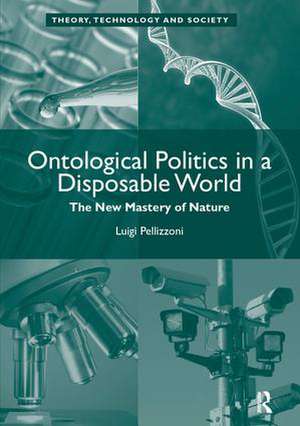Ontological Politics in a Disposable World: The New Mastery of Nature
Autor Luigi Pellizzonien Limba Engleză Hardback – 28 iul 2015
| Toate formatele și edițiile | Preț | Express |
|---|---|---|
| Paperback (1) | 389.05 lei 6-8 săpt. | |
| Taylor & Francis – 18 apr 2019 | 389.05 lei 6-8 săpt. | |
| Hardback (1) | 767.93 lei 6-8 săpt. | |
| Taylor & Francis – 28 iul 2015 | 767.93 lei 6-8 săpt. |
Preț: 767.93 lei
Preț vechi: 1104.98 lei
-31% Nou
Puncte Express: 1152
Preț estimativ în valută:
146.96€ • 152.86$ • 121.33£
146.96€ • 152.86$ • 121.33£
Carte tipărită la comandă
Livrare economică 14-28 aprilie
Preluare comenzi: 021 569.72.76
Specificații
ISBN-13: 9781472434944
ISBN-10: 1472434943
Pagini: 268
Dimensiuni: 174 x 246 mm
Greutate: 0.66 kg
Ediția:1
Editura: Taylor & Francis
Colecția Routledge
Locul publicării:Oxford, United Kingdom
ISBN-10: 1472434943
Pagini: 268
Dimensiuni: 174 x 246 mm
Greutate: 0.66 kg
Ediția:1
Editura: Taylor & Francis
Colecția Routledge
Locul publicării:Oxford, United Kingdom
Notă biografică
Luigi Pellizzoni is Associate Professor of Environmental and Political Sociology at the University of Trieste, Italy and co-editor of Neoliberalism and Technoscience.
Recenzii
'The relevance of cutting edge social theory to resolving the environmental crisis is often far from obvious. Luigi Pellizzoni brings welcome clarity to the often opaque world of post-humanism, new materialism and the ontological turn while providing an unusually sophisticated analysis of how we humans are transforming nature. There is a lot in this book to think about. It is worth reading at least twice.’ - Stewart Lockie, James Cook University, Australia ’Excellent, erudite speculative philosophy, insightful commentary on the works of Adorno, Heidegger, Foucault, etc. Most originally, it convincingly demonstrates the emergence of mastery-of-nature culture 2.0 for human enhancement, whereby the risks and uncertainties of manipulating nature’s dynamics are not ignored, nor feared, nor even managed, but instead exuberantly ridden, for better or for worse.’ Raymond Murphy, University of Ottawa, Canada ’Ontological Politics in a Disposable World provides a rich and nuanced account of how society, scientific knowledge, and nature are being transformed in neoliberal times.’ - Charles Thorpe, University of California, San Diego, USA
'This is an exciting book, thick, dense, supported by solid arguments and political passion. It is particularly useful for those engaging with the semiotics of the ontological turn. It can hopefully contribute to fostering a necessary debate on the explicit and implicit relationships between the politics of the ontological turn and neoliberalism.' - Andrea Ghelfi, Environmental Values
'This is an exciting book, thick, dense, supported by solid arguments and political passion. It is particularly useful for those engaging with the semiotics of the ontological turn. It can hopefully contribute to fostering a necessary debate on the explicit and implicit relationships between the politics of the ontological turn and neoliberalism.' - Andrea Ghelfi, Environmental Values
Cuprins
Introduction; Chapter 1 The New Mastery of Nature; Chapter 2 Nature, Government and the Ontology of the Present; Chapter 3 The Ontological Turn in Social Theory; Chapter 4 From Darwin to Heidegger:; Chapter 5 Towards a Critical Humanism;
Descriere
This book explores the intertwining of politics and ontology, shedding light on the ways in which, as our ability to investigate, regulate, appropriate, ’enhance’ and destroy material reality have developed, so new social scientific accounts of nature and our relationship with it have emerged, together with new forms of power. Engaging with cutting-edge social theory and elaborating on the thought of Foucault, Heidegger, Adorno and Agamben, the author demonstrates that the convergence of ontology with politics is not simply an intellectual endeavour of growing import, but also a governmental practice which builds upon neoliberal programmes, the renewed accumulation of capital and the development of technosciences in areas such as climate change, geoengineering and biotechnology.
